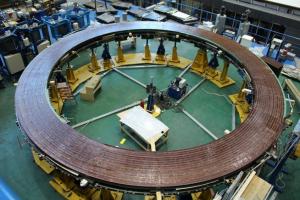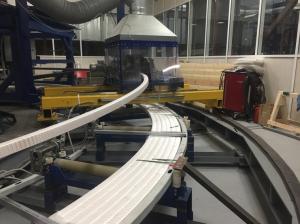Smallest ring coil
Production at halfway mark
27 Nov 2017
At the Srednenevsky Shipbuilding Plant in Saint Petersburg, Russia, specialists from JSC "SNSP" and the Efremov Institute (NIIEFA) are winding the fifth double pancake of the future coil.
This double pancake for poloidal field coil #1 is leading the way: it was the first pancake wound after the conclusion of qualification activities; now, it has been through the vacuum pressure impregnation process which creates a rigid assembly.
Eight double pancakes in all will be necessary to complete this 300-tonne magnet which will be installed at the top of the machine, crowning the 18 toroidal field magnets and steel vacuum vessel. With the five other ring magnets, poloidal field coil #1 (PF1) will contribute to shaping the plasma and contributing to its stability by "pinching" it away from the walls.
Following the signature of the Procurement Arrangement with the ITER Organization in 2011, the Russian Domestic Agency chose the Efremov Institute, Saint Petersburg, as the main supplier. Most of the winding equipment has been designed, manufactured, and tested at the Efremov Institute, which has also developed some of the poloidal field coil manufacturing processes; JSC "SNSP" has contributed a number of science-based technologies. Approximately six kilometres of niobium-titanium (NbTi) superconductor will be required to wind PF1.
Winding is underway on double pancake #5 (of eight). At the same time as the niobium-titanium conductor is wound into the correct dimensions, it is insulated with glass-fibre tape.
In 2014, all equipment was transported to the Srednenevsky Shipbuilding Plant, located in an area which is a well suited to the needs of transporting the completed component. Following the successful passage of qualification milestones, double pancake winding began in 2014. Teams are currently winding the fifth double pancake of the series of eight; the first two have passed the impregnation phase and the third is undergoing impregnation now.
During vacuum pressure impregnation, or VPI, epoxy resin is injected into a sealed mould containing the double pancake and then cured to solidify, creating a rigid assembly.
In accordance with the schedule, the magnet is to be completed, tested and delivered to the ITER site in 2021.



